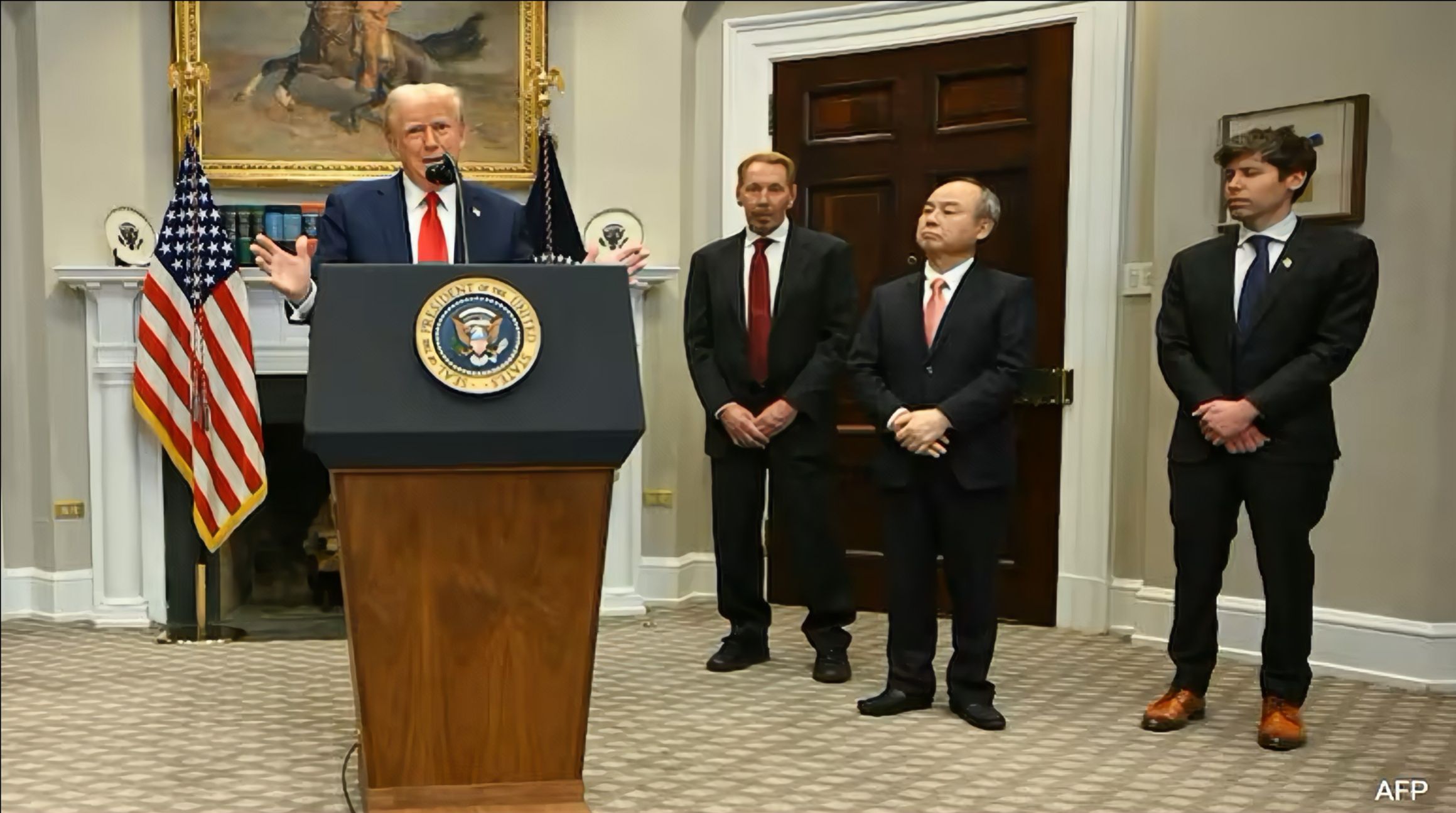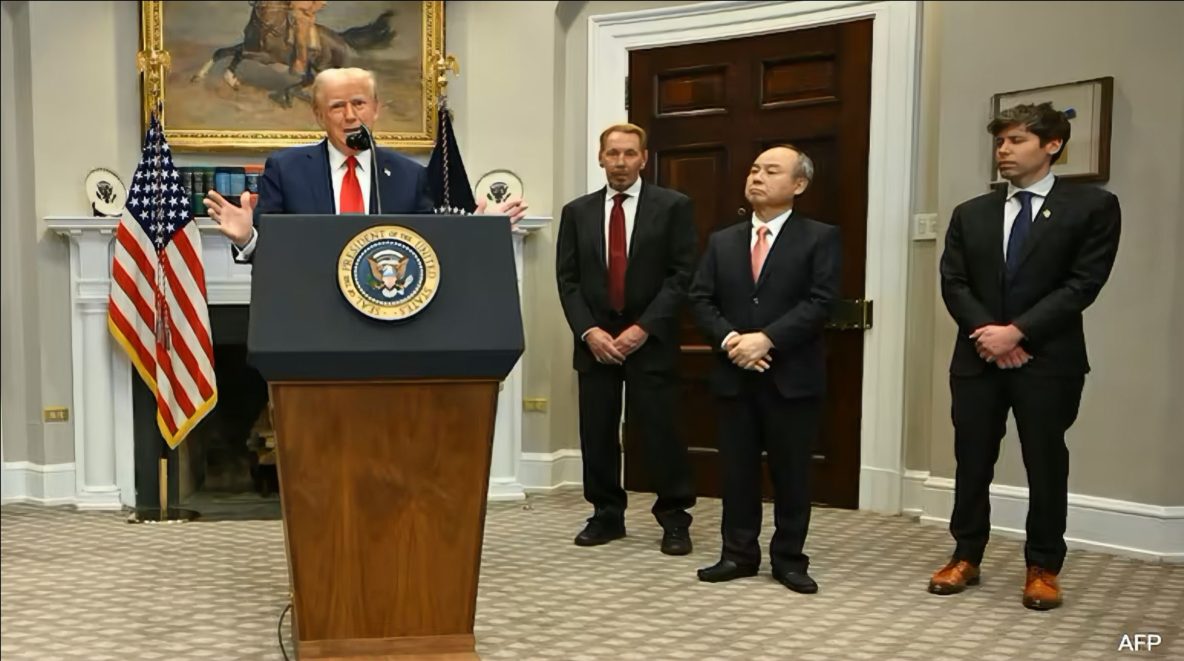

Source: AFP, Donald Trump with Larry Elison (Oracle), Masayoshi Son (SoftBank) and Sam Altman (OpenAI)
An analysis of events in the weeks leading up to the inauguration, and the days following it, reveals that the overall effect of a Trump presidency on stock and bond markets is mildly positive. Once again, there is already emerging a gap between populist election promises and governmental implementation.
For instance, Trump had said on social media before the election that tariffs of between 10% and 60% would be imposed on Mexico, China and Canada on his first day in office, 20 January. But Trump said after the inauguration that he “isn’t ready” to move ahead with universal tariffs on goods from around the world. The new aim, advanced on day 1 was changed to 25% tariffs on imports from Canada and Mexico on 1st Feb – but only after federal agencies have “analysed” trade practices and policies. The market took this to mean the promised tariffs have been put on hold and the US dollar dropped on the news.
Then, one day later, Trump stated that tariffs on China would be 10%. But only if half of TikTok were sold to an American company. Otherwise it would 20%.
Little to necessitate a change in existing Loftus Peak valuation process
Below is a checklist of some of the executive orders, and where appropriate commentary regarding the impact on portfolios we manage:
• Aiming to improve the U.S. trade position is the revocation of a 2021 Biden executive order that sought to ensure half of all new vehicles sold in 2030 were electric. It is also highly likely (but not certain yet) that the federal tax benefit of up to US$7,500 for certain new electric vehicles will be scrapped. Both of these are likely to hurt China and Chinese car makers who make the majority of electric vehicles. Elon Musk should apparently be fine because Tesla has made an overnight transformation into a robotics company.
• The brakes look to be coming off corporate takeover activity, which again should be positive for markets as well as the portfolio. To be clear, Loftus Peak does not set out to buy companies for possible takeovers, though companies with attractive valuations are often likely to become targets.
• Trump also announced a private sector investment of up to US$500 bn to fund infrastructure, ie datacentres, for artificial intelligence (“Stargate”), aiming to outpace rival nations in business-critical technology. This proposal will be supported by ChatGPT’s creator OpenAI, Japanese tech group SoftBank and Oracle. It is intended that these data centres will create more than 100,000 jobs in the United States. This pushed the value higher of a number of holdings in Loftus Peak.
• One significant Trump 2.0 deal which could come off would see Intel recapitalised with new partners to salvage its floundering U.S. domiciled foundry business. Potential partner suggestions thrown around includes Qualcomm, Broadcom, Global Foundries as well as input from Musk and other ‘tech bros’, like Peter Thiel. If this happens it will change the calculus around investing in semiconductors both in terms of manufacturing equipment, manufacturing and the choices designers make in choosing their manufactuer. That said, it seems like no amount of money can help Intel catch Taiwan Semiconductor Manufacturing Co. in the medium term.
• Cryptocurrencies are net beneficiaries. Trump has appointed a trenchant critic of technology regulation, David Sacks, to oversee the area. Trump has also launched his own cryptocurrency – OFFICIAL TRUMP – which soared ten fold before halving 36 hours later. This has not been an area in which the Loftus Peak investment process is well suited and so there has been no investment.
There is a slew of non-financial orders, which are not law, but significantly roll back regulatory impositions. These include rescinding the Biden administration’s checks on artificial intelligence which halted the implementation of key safety and transparency requirements for AI developers. Additionally, ‘green tape’ preventing drilling for hydrocarbons is to be abolished, while permits for nuclear will become easier. Health reform may also be on the agenda, though the powerful hospitals and insurers have long proved more capable at gaming the system than the government has proved regulating it.
Included in the non-financial orders is reducing military involvement overseas, and renegotiating international agreements to benefit the United States, with the important carve-out against China, on which policy is hawkish. In the realm of energy and the environment, Trump is promoting American energy independence by supporting fossil fuels and rolling back regulations he views as restrictive to the industry. He opposes the Green New Deal and emphasises the economic benefits of energy development.
There are many other developments too numerous to outline here. For the next four years we will need to be agile in portfolio construction as decisions are made on the run. We will be supported in this approach by our short lines of internal communication and the deep liquidity in our holdings.
Share this Post


